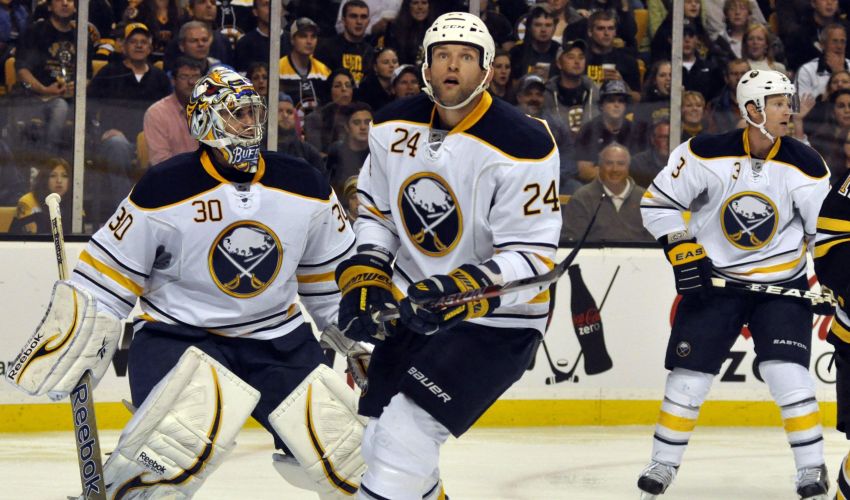AMHERST – Ryan Miller first noticed the ominous signs of another NHL lockout last year when the NBA and NFL negotiated new labor deals favorable to ownership. Right away, the Buffalo Sabres goalie knew “hockey would take a crack at” getting money back from the players.
For Robyn Regehr, the cold reality of a work stoppage hit him last week in New York during a meeting at the league offices with Players’ Association executive director Donald Fehr, commissioner Gary Bettman and top deputy Bill Daly.
The defenseman sensed the worst from Bettman’s demeanor, tone and words.
“No matter what we said to him, what we talked about, he wasn’t willing to look at anything else,” Regehr said Friday after skating inside the Northtown Center. “I think at that point we probably understood that we were probably headed down this road.”
The two sides reach the end of the road at midnight tonight, when, barring a miracle, the NHL plans to lock out its players for the third time in 18 years. The last lockout wiped out the entire 2004-05 season.
Neither side is budging right now.
The players say the league is healthy and making money. They believe their offers are fair and make concessions that would help stabilize money-losing teams through better revenue sharing.
Meanwhile, the NHL, despite generating record revenues under a collective bargaining agreement in which owners won most of their demands, wants the players’ share of hockey-related revenue down from 57 percent to about 47 percent in a new deal.
“It’s take it or leave it; our way or the highway and you’re getting locked out,” Regehr said.
Defenseman Christian Ehrhoff added: “The owner’s got their deal (last time). We gave up pretty much everything that they asked of us. And after all the years of revenue growth we believe it’s just not fair we have to make all the sacrifices again.”
At the NHLPA meetings Thursday in New York, Miller, one of 11 Sabres and 283 players in attendance, questioned why Bettman still has a job if the NHL always operates at a loss.
Miller called the comments “tongue-in-cheek” Friday, and then kept hammering away.
“If he’s really doing what he says he’s doing, why is he still employed?” Miller said. “Our case is he’s doing what the owners want him to do. The league is healthy. The league makes money. There are definitely teams that need help, and we feel we came up with a way to assist them in doing that.
“We don’t want to go down the same path we went to last time and always end up with another situation where they want to lock us out. It can’t be every single time we negotiate, ‘Oh, we’re going to lock the players out.’ We have to build the game. We have to have respect for the fans, and it’s too much.”
Regehr worries fans could bolt from the game for good with another lockout. They returned following the last stoppage, and the NHL grew to record levels.
“(Owners are) just coming after the players for a lot of the share of their costs,” Regehr said. “They’ve done that before. … (Players are) seeing the exact same thing about player cost, and we’re going through this again even though we know the revenues have grown for them quite nicely.”
Ultimately, the league caters to the top-earning teams, said Miller, who was disappointed owners voted unanimously Thursday to authorize the lockout.
“I don’t think that clear picture about what every single team needs is being presented,” he said. “They’re still looking out for some of the best interests of the top teams, in my mind, money-wise. If they want to run a league where they run teams in areas they say they’re losing money, it’s got to be a partnership in how to care for these teams.
“While I don’t agree with hardly anything Gary says, we need teams in places like Phoenix. We need them in places like Florida. It’s because that’s relevant for TV.”
Regehr added: “(The league’s proposal) doesn’t fix the big problem with the NHL, which is the revenue disparity problem. We want to fix this thing once and for all as players.”
Miller, a youngster in the AHL when the last lockout hit, said players have planned for the worst and are better prepared for a stoppage than in 2004.
“They’re going to find a group that’s more educated, and when they try to tell us things, we’re going to go back and check on them, audit the numbers,” Miller said. “ … You can make numbers do whatever you want.”
Players will be free to sign elsewhere during the lockout, so the group of Sabres that have been skating together may soon scatter.
If Ehrhoff can work out the insurance, he plans to return to his native Germany and play for his hometown DEL club.
Miller’s heading back to his offseason home in Los Angeles soon and will treat the next month as summer training. He could think about playing somewhere else after that.
Regehr thought about joining his brother, Richie, in Sweden, but the SEL isn’t taking temporary NHL players. The 32-year-old, who only played for Team Canada and touring teams during the last lockout, plans to “sit tight” in Buffalo.


